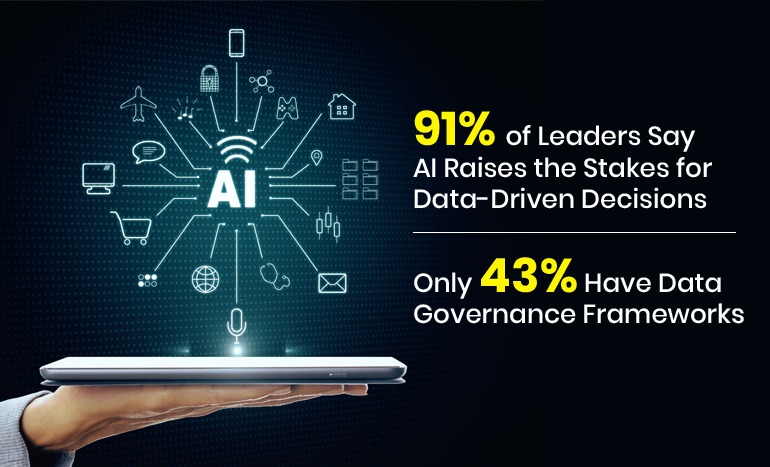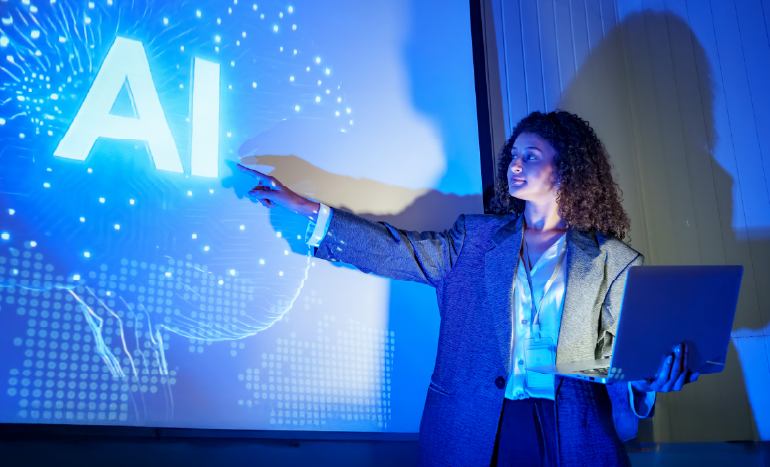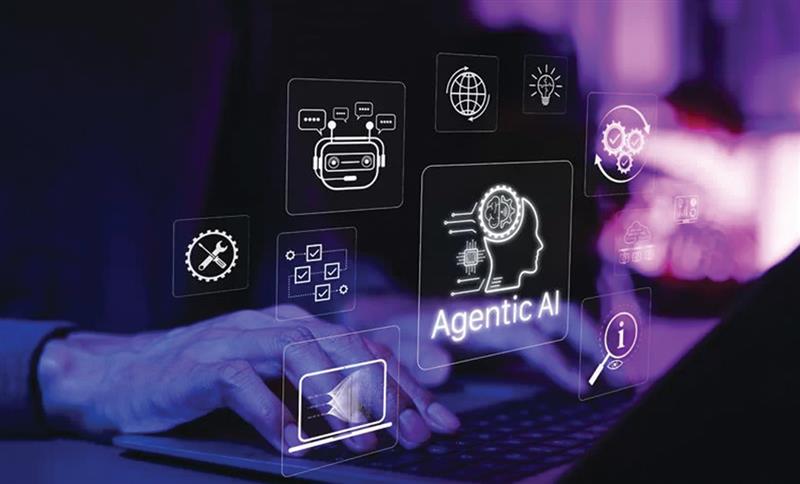Artificial Intelligence (AI) has moved beyond science fiction into boardrooms and marketing departments worldwide. By 2024, approximately 78% of companies had integrated AI into at least one business function, with marketing among the leading adopters, according to Hostinger. This digital transformation isn’t just changing how we reach customers; it’s revolutionizing the entire marketing landscape.
The shift toward AI marketing represents more than a technological upgrade. It’s a fundamental reimagining of how businesses understand, engage, and convert their audiences. AI drives competitive marketing strategies by using predictive analytics to forecast customer behavior and automated content creation to scale personalization.
Enterprises maintain their market position by understanding and implementing AI marketing. This guide explores how artificial intelligence is reshaping digital marketing and what it means for your organization’s future growth.
Understanding AI and Its Applications in Digital Marketing
Artificial intelligence in marketing refers to technology systems that can analyze data, learn patterns, and make decisions with minimal human intervention. AI systems continuously improve their performance through machine learning algorithms, unlike traditional marketing tools that require constant manual input.
Key AI Applications Transforming Marketing
Predictive Analytics powers smarter decision-making by analyzing historical data to forecast future customer behaviors, purchase patterns, and market trends. Studies show companies using predictive analytics often see stronger customer satisfaction and revenue growth compared to those relying only on traditional methods.
Automated Content Creation tools like Jasper and Copy.ai generate marketing copy, social media posts, and email campaigns at scale. These platforms analyze successful content patterns and audience preferences to create personalized messaging that resonates with specific customer segments.
Dynamic Personalization engines process real-time user data to customize website experiences, product recommendations, and promotional offers. Netflix’s recommendation engine plays a major role in viewer engagement, exemplifying how AI personalization directly impacts business results.
Chatbots and Virtual Assistants handle customer inquiries 24/7, qualify leads, and provide instant support. Advanced conversational AI can now manage complex customer interactions, reducing response times from hours to seconds while maintaining high satisfaction scores.
Enhancing SEO with AI
AI digital marketing has fundamentally transformed Search Engine Optimization (SEO) strategies. Modern SEO requires understanding not just keywords, but user intent, semantic relationships, and content quality signals that AI-powered search algorithms prioritize.
AI-Driven SEO Strategies
Intelligent Keyword Research tools like SEMrush and Ahrefs use machine learning to identify high-opportunity keywords, analyze competitor strategies, and predict ranking difficulty. These platforms process millions of data points to suggest keyword variations and content topics that traditional research methods might miss.
Content Optimization platforms analyze top-performing content across industries to recommend improvements for readability, structure, and semantic relevance. Artificial intelligence tools can identify content gaps, suggest internal linking opportunities, and optimize meta descriptions for higher click-through rates.
Technical SEO Automation helps enterprises manage complex website architectures through AI-powered site audits, automated schema markup generation, and real-time performance monitoring. These systems identify and prioritize technical issues that impact search rankings, enabling faster resolution and better search visibility.
Voice Search Optimization is crucial. Conversational search becomes increasingly critical as smart speakers become more common in households worldwide. Artificial intelligence helps marketers understand conversational query patterns and optimize content for natural language processing algorithms.
Improving Customer Experience with Artificial Intelligence
Marketing automation powered by artificial intelligence creates seamless, personalized customer journeys that adapt in real-time based on individual behaviors and preferences.
Personalization at Enterprise Scale
Behavioral Analytics platforms track customer interactions across all touchpoints, creating comprehensive user profiles that inform personalization strategies. Amazon’s AI-driven recommendation system is a core driver of product discovery and sales, contributing significantly to its overall revenue.
Dynamic Content Delivery adjusts website layouts, product displays, and promotional messaging based on visitor characteristics, browsing history, and predictive models. This level of personalization increases conversion rates by up to 15% while reducing bounce rates significantly.
Intelligent Customer Support combines chatbots with human agents to provide efficient, contextual assistance. AI systems can escalate complex issues to appropriate specialists while handling routine inquiries automatically, improving response times and customer satisfaction scores.
Omnichannel Orchestration ensures consistent messaging across email, social media, mobile apps, and websites. AI coordinating these touchpoints creates cohesive customer experiences that build brand loyalty and increase lifetime value.
Challenges and Ethical Considerations
Successful implementation of AI requires addressing several critical challenges that affect both effectiveness and brand reputation. The SEIDOR AI Report 2025 shows that while 78% of companies plan to boost artificial intelligence investments in the coming year, many still lack a clear strategy, and 31% are unsure how to leverage AI competitively.
Implementation Challenges
Data Privacy Compliance becomes increasingly complex as regulations like GDPR and CCPA require explicit consent for data collection and processing. Organizations must implement artificial intelligence systems that respect privacy preferences while still delivering personalized experiences.
Integration Complexity can overwhelm existing marketing technology stacks. Enterprises often struggle with connecting AI tools to legacy systems, requiring careful planning and potentially significant infrastructure investments.
Talent Acquisition remains challenging as demand for AI-skilled marketers exceeds supply. Companies need professionals who understand both marketing strategy and AI capabilities to maximize return on investment.
Ethical Guidelines for AI Marketing
Transparency Requirements mandate clear disclosure when AI systems interact with customers or influence marketing decisions. Consumers increasingly expect brands to be honest about automated processes affecting their experiences.
Algorithmic Fairness ensures AI systems don’t discriminate against specific demographic groups or perpetuate existing biases. Regular audits of AI decision-making processes help maintain ethical standards while protecting brand reputation.
Data Responsibility involves implementing robust security measures and using customer data only for stated purposes. Breaches of trust can severely damage customer relationships and business growth potential.
Embracing the AI-Powered Marketing Future
The transformation of digital marketing through artificial intelligence isn’t a distant possibility; it’s happening now. Organizations that embrace AI marketing today position themselves for sustained competitive advantage, while those that delay risk falling behind rapidly evolving customer expectations and market standards.
Success with AI marketing requires more than technology adoption. It demands strategic thinking, ethical implementation, and continuous learning. The most effective approach combines AI’s analytical power with human creativity and oversight, creating marketing programs that are both efficient and authentically engaging.
If 2023 was the year the world discovered generative AI, 2024 marked the year organizations began extracting business value. In early 2024, McKinsey found that AI adoption surged from around 50% to 72%, with marketing and sales adoption more than doubling within business functions.
Digital marketing with AI represents an opportunity to build deeper customer relationships, drive operational efficiency, and achieve measurable growth. The question isn’t whether AI will reshape your marketing efforts; it’s whether you’ll lead that transformation or follow others who moved first.
Ready to explore how AI can transform your digital marketing strategy? The future of customer engagement starts with the decisions you make today. Contact us today to explore how Impelsys can help you leverage AI to drive smarter marketing strategies.
Authored by: Benjamin Oswald Samodar







